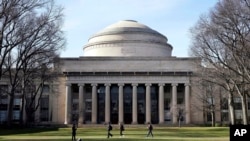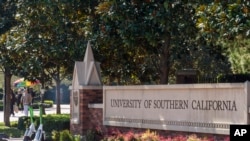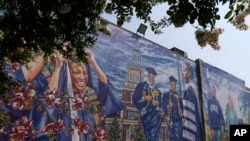Student Union
Test Takers File Suit Over Failed Online Exams
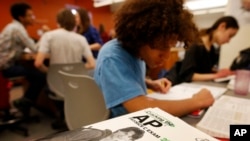
Students who took online tests and received an error message when they hit "submit" have filed a lawsuit against the organization that administers the tests.
The suit was filed in federal district court in Los Angeles and seeks over $500 million in damages after Advanced Placement test takers were told their files couldn't be uploaded or were corrupted.
"The College Board acknowledged that these issues existed, but it did not change its policies to address them," according to the suit filed by Baker, Keener & Nahra LLP and Miller Advocacy Group in Los Angeles.
Advanced Placement (AP) tests allow students to take college-level courses in high school. In some cases, students can test out of college courses, advancing their studies early and saving them money on course fees.
To complete the test, AP science students were required to take photos of their work, upload them to their computer, convert the file, and load them into the test interface. Problems arose when photo uploads of students' work were denied or deemed corrupted.
"On May 24, 2020, after 3 full days of at-home AP exams, the College Board admitted that there was a measurable failure rate in uploading the exams, and it attempted to change its policies going forward," the suit alleges. "The College Board's President David Coleman acknowledged in an email that, 'we can't control the conditions in students' home.'"
Special needs violation?
Besides students, the plaintiffs include the National Center for Fair & Open Testing (FairTest), who opposes "the misuses and flaws" of the standardized testing system, according to Forbes.
Other complications included extreme difficulty securing approved academic accommodations and heightened test anxiety, The Chronicle for Higher Education reported.
The suit alleges that this violated the Americans With Disabilities Act for students with special accommodations. For example, if a student required a quiet testing space and has a legal accommodation, having to take a test at home might not meet that requirement.
The organization's testing procedures are "simple; secure and fair; accessible to all; and valid for use in college admissions," according to the College Board's website.
College Board's reaction
The College Board has stated that only 1% of test takers each day had problems, according to The Chronicle for Higher Education. However, high school teachers and counselors said up to 20% of students could not submit answers.
After receiving complaints about the system, the College Board instituted an emergency procedure, enabling students to email their responses to the organization.
The College Board website instructs students to change their phone's camera settings to capture images as a JPEG file and asks test takers to use the final 5 minutes of the exam to upload their work.
The College Board has dismissed the lawsuit, saying "it is wrong factually and baseless legally; the College Board will vigorously and confidently defend against it, and expect to prevail," said Peter Schwartz, College Board chief risk officer and general counsel, in a statement to The Washington Post.
Typically lasting several hours and administered by a proctor, the College Board introduced online, 45-minute exams after the in-person tests were canceled in March. About 2.2 million students took online exams, the College Board said.
The College Board, which also administers the SAT college entrance exam, has come under fire in recent years as standardized testing falls in popularity.
Students can retake the tests in June.
See all News Updates of the Day
Social media breaks are difficult, but necessary

Between online classes, maintaining social connections and working on projects, college students can have a hard time disengaging from the demands of technology.
In Florida International University’s PantherNOW, Ariana Rodriguez offers strategies for taking a break from social media. (April 2024)
- By Melos Ambaye
Many master's degrees aren't worth the investment, research shows
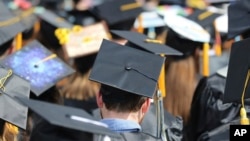
Nearly half of master's degrees have a negative financial return, according to new research by the Foundation for Research on Equal Opportunity, an economic research organization.
The study indicates that many graduate degree programs do not increase lifetime earnings enough to be worth it.
While 23% of bachelor’s degree programs yield a negative financial return on investment, 43% of two-year degrees and master’s degrees fail to deliver a return, according to the study by Preston Cooper, a senior fellow at FREOPP.
Cooper assessed the return on investment for 53,000 degree and certificate programs to determine whether a student’s lifetime earnings outweigh program costs and the risk of not completing their degree.
His findings show that a student’s field of study was the overriding indicator of return on investment at the undergraduate and graduate level.
Engineering, computer science and nursing bachelor’s degrees have high financial returns on investment, while programs in education, fine arts, psychology and English usually have low returns.
Graduate degrees in medicine and law tend to have strong payoffs. But a large share of master’s programs, including the MBA, frequently have low payoffs, according to Cooper.
Although workers with master’s degrees earn 16% more than those with only bachelor’s degrees, Cooper says the figure fails to account for students who had “higher preexisting earnings potential.”
“MBA students typically have high preexisting earnings potential, having often chosen high-ROI undergraduate majors such as finance and economics,” Cooper writes. “So the MBA adds little value on top of that.”
The study indicates that high starting salaries are predictors of high returns on investment. Degrees with starting salaries of $57,000 a year or more deliver the best lifetime returns.
But the return on investment of a degree can vary depending on the educational institution.
“Students interested in fields with low average pay can still find some schools that do well transforming those fields of study into high-paying careers,” Cooper writes.
The quality of an institution also matters, said William Tierney, professor emeritus of higher education at the University of Southern California.
“An MBA from Harvard is a likely ticket to a good job,” Tierney told VOA. “An MBA from the University of Phoenix, less so.”
But students pursue graduate programs for more than just financial reasons.
“Some degrees open up careers in fields that students may enjoy, such as in the performing arts,” Robert Kelchen, head of educational leadership at the University of Tennessee, Knoxville, told VOA.
“Others can help gain access to social networks or simply help students learn about a topic that is of interest,” Kelchen added.
Cooper told VOA that it might make sense for students in degree programs with low returns on investment to switch majors if they can still graduate on time.
He found the worst outcome for a student’s return on investment is dropping out of college “because they must pay for one or more years’ tuition and spend time out of the labor force.”
Lawmakers who fund higher education have a responsibility in ensuring “higher education delivers on its promise of economic mobility,” Cooper said.
Nearly a third of federal funding, including Pell grants and student loans, pays for higher education programs that fail to provide students with a return on investment, according to the study.
Cooper’s view is that “some schools should shut down low-ROI programs and reallocate institutional resources to programs with a better return.”
“There's definitely this narrative out there that higher education is always worth it, and you should always try to get that extra degree because it will increase your earnings,” he told VOA. “That's reinforced by colleges who make lofty promises regarding their graduate degree programs' outcomes, which all too often fall short.”
Harvard students end protest as school agrees to discuss Gaza conflict
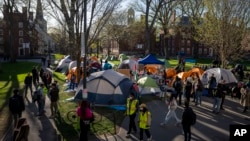
Protesters against the war between Israel and Hamas were voluntarily taking down their tents in Harvard Yard on Tuesday after university officials agreed to discuss their questions about the endowment, bringing a peaceful end to the kinds of demonstrations that were broken up by police on other campuses.
The student protest group Harvard Out of Occupied Palestine said in a statement that the encampment "outlasted its utility with respect to our demands." Meanwhile, Harvard University interim President Alan Garber agreed to pursue a meeting between protesters and university officials regarding the students' questions.
Students at many college campuses this spring set up similar encampments, calling for their schools to cut ties with Israel and businesses that support it.
The Israel-Hamas war began when Hamas and other militants stormed into southern Israel on October 7, killing some 1,200 people and taking 250 hostages. Palestinian militants still hold about 100 captives, and Israel's military has killed more than 35,000 people in Gaza, according to Gaza's Health Ministry, which doesn't distinguish between civilians and combatants.
Harvard said its president and the dean of the Faculty of Arts and Sciences, Hopi Hoekstra, will meet with the protesters to discuss the conflict in the Middle East.
The protesters said they worked out an agreement to meet with university officials, including the Harvard Management Company, which oversees the world's largest academic endowment, valued at about $50 billion.
The protesters' statement said the students will set an agenda that includes discussions on disclosure, divestment, reinvestment and the creation of a Center for Palestine Studies. The students also said that Harvard has offered to retract suspensions of more than 20 students and student workers and back down on disciplinary measures faced by 60 more.
"Since its establishment three weeks ago, the encampment has both broadened and deepened Palestine solidarity organizing on campus," a spokesperson for the protesters said. "It has moved the needle on disclosure and divestment at Harvard."
Chinese students report interrogations, deportations at US airports
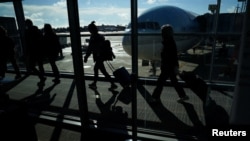
Academics from China are reporting increased scrutiny at U.S. airports, with valid visa holders being interrogated and turned away by Customs and Border Protection Agents.
Phones and laptops have been searched, and researchers have undergone extensive questioning about their work. One graduate student at Yale, who was midway through her PhD, was turned back at Dulles airport and banned from entering the U.S. for five years, according to The Guardian.
- By Phil Mercer
Australia plans limits on international students
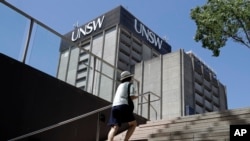
Australia says it will impose limits on the number of international students coming into the country to ease stress on housing and to reduce immigration.
The government in Canberra has said that international education programs, under which foreign students come to study in Australia, were fertile ground for immigration and visa fraud.
In 2023, official figures show that 787,000 international students studied in Australia, exceeding levels seen before the COVID-19 pandemic.
The Canberra government plans to cap the number of overseas students to ease stress on rental accommodation and to curb levels of immigration.
Senior government ministers have said caps for education would be part of a broader plan to manage migration, increase the availability of housing and to address skills shortages in the economy.
However, the university sector has insisted the proposals would damage Australia's global reputation as a welcoming, safe and world-class destination for students from other countries.
Education has been one of Australia’s most lucrative exports, but the left-leaning government in Canberra has said the international education sector, which includes many smaller private English language colleges, vocational and training institutions as well as larger universities, has been used as a way for unskilled migrants to stay in Australia.
Michael Wesley, the deputy vice chancellor at the University of Melbourne, told the Australian Broadcasting Corp. Tuesday that he hopes the government will target unscrupulous education providers.
“We welcome the crackdown on non-genuine education providers, which provide a backdoor into permanent residency for people who are not genuine students," Wesley said. "We are confident that all of our international students are genuine students and, so, we would hope that the impact of these visa caps will be at the non-genuine end of the education sector.”
Rental accommodation in many of Australia’s larger cities is often expensive and in short supply.
Analysts have said that surging prices are the result of years of underinvestment in affordable housing.
Education institutions would be required to build accommodations for their students if they wanted to exceed limits of the caps. Specific quotas for international students have not yet been made public.
The government in Canberra said it will change Australia’s Education Services for Overseas Students Act to give the education minister the authority to set limits on student enrolments for each education establishment, including specific courses or locations.
The majority of overseas students in Australia come from five countries: China, India, Nepal, the Philippines and Vietnam, according to government data. They contribute billions of dollars to the Australian economy.




